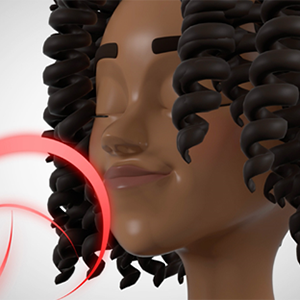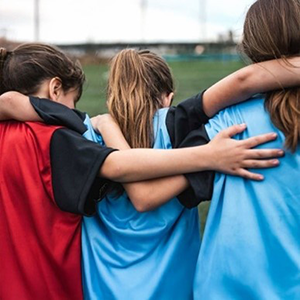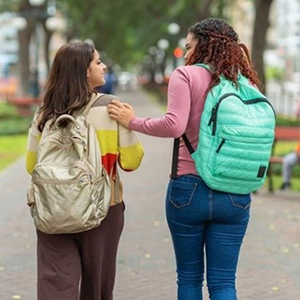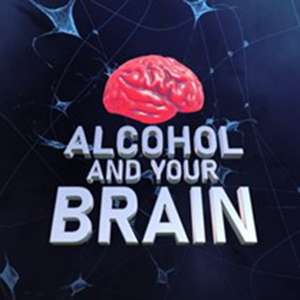
Alcohol and Your Brain: A Virtual Reality Experience
This immersive interactive teaches teens about alcohol’s effects on five areas of the human brain. It simulates a rollercoaster ride weaving and bobbing its way through the prefrontal cortex, nucleus accumbens, amygdala, hippocampus, and cerebellum. Students can control the rail car and pause at stations to learn about these key brain regions affected by alcohol—and how the substance, in turn, affects behavior. Educators and students can access Alcohol and Your Brain in two ways: 1.) a free virtual reality (VR) version for those ages 13+ with access to Quest, Quest 2, or Meta Quest Pro VR headsets, or 2.) a free video or audio-described version.
Grades: Middle and high school
Produced by: National Institutes on Alcohol Abuse and Alcoholism

Alzheimer’s and Aging Resources for Students
This webpage provides easy-to-read materials, articles, and fact sheets on Alzheimer’s and related dementias, and on caregiving, aging, and issues related to older adults. Visitors can also learn about internships at the National Institute on Aging and NIH.
Grades: High school
Produced by: National Institute on Aging
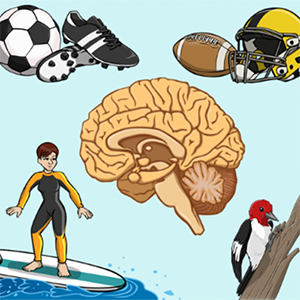
BiblioTech REBOUND: Beating Concussions
In this interactive reading experience about concussions, sports, and brain health, students travel along as a BMX-rider uncovers the truth about concussions to help his twin sister get back on the basketball court.
Grades: 4-6
Produced by: The Partnership in Education, Duquesne University (SEPA funded)
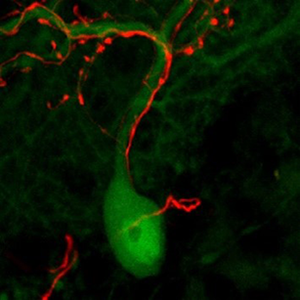
BrainU: Neuroscience Resources
Students learn neuroscience concepts with materials that include lesson plans, handouts, activities, and videos. Lesson support and other teacher resources are also provided.
Grades: Elementary through high school
Produced by: University of Minnesota Twin Cities (SEPA funded)
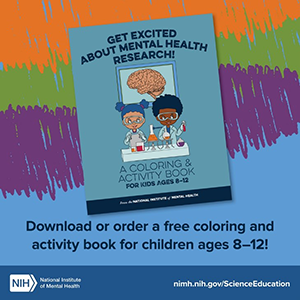
Get Excited About Mental Health Research! Coloring and Activity Book
This printable coloring and activity book for children ages 8 through 12 provides information about types of mental health research, the process for conducting research, and paths to becoming a mental health researcher.
Grades: 3-7
Produced by: National Institute of Mental Health
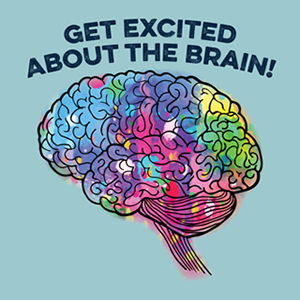
Get Excited About the Brain!
This science education activity book helps kids learn facts about the brain through games and puzzles about brain science and research.
Grades: Elementary and middle school
Produced by: National Institute of Mental Health
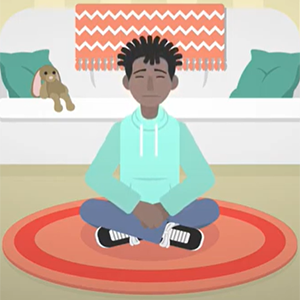
Heartbeat: A Mindfulness Exercise to Calm Your Emotions
This mindfulness exercise video can help to calm overwhelming emotions and the racing heartbeat associated with them. The activity doesn't require any materials and takes just a few minutes for students to complete.
Grades: Middle and high school
Produced by: The Partnership in Education, Duquesne University (SEPA funded)
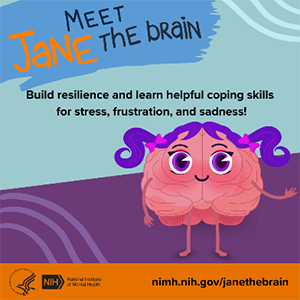
Jane The Brain: Video Series
Meet Jane the Brain! This colorful new video series introduces students to Jane, our super-smart and friendly animated character, who helps kids understand and cope with big feelings like stress, frustration, and sadness.
Grades: Elementary
Produced by: National Institute of Mental Health
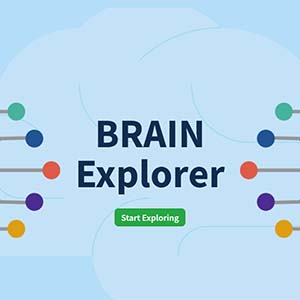
NIH BRAIN Initiative BRAIN Explorer Educational Experience
This choose-your-own-experiment educational experience is based on discoveries from real NIH BRAIN Initiative researchers! Students learn about the scientific method and the brain as they explore scientific experiments with the knowledgeable octopus, Dr. Octowise.
Grades: Middle and high school
Produced by: National Institutes of Health (NIH)
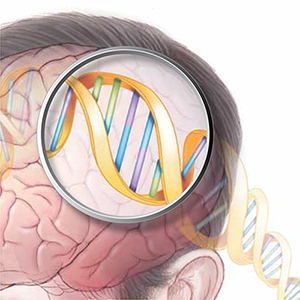
NINDS Brain Resources Page
This webpage provides educational resources related to brain health and function for parents, students, and teachers. These and additional educational materials can be ordered online in bulk for use in classrooms. Additional neuroscience educational videos and activities you can do at home to learn about the brain can be found on the NINDS Outreach and Science Education YouTube playlist.
Grades: High school
Produced by: National Institute of Neurological Disorders and Stroke (NINDS)

Nurturing My Mental and Emotional Health
Mental and emotional well-being is critical to overall health. Supporting teens in developing healthy coping skills can set them up for success in dealing with stress and challenging circumstances in the future. This activity helps promote mindfulness and teaches teens how to practice health-enhancing behaviors, which can support better management of stress and reduce the chances of exploring substance use as an alternative. Available in Spanish.
Grades: 6-12
Produced by: National Institute on Drug Abuse
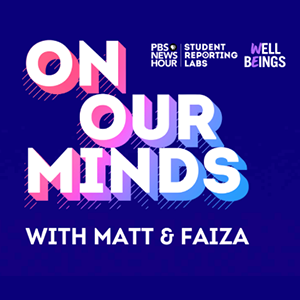
On Our Minds Podcast
This student-led and student-produced podcast discusses the biggest mental health challenges young people face. In each episode, two teen reporters explore stories from high schoolers of PBS NewsHour Student Reporting Labs that highlight the teenage experience.
Grades: High school
Produced by: PBS NewsHour Student Reporting Labs (SEPA funded)
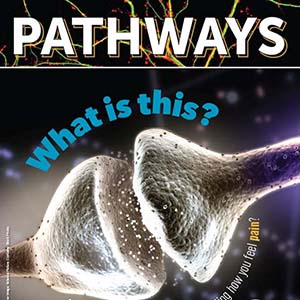
Pathways: The Brain and Anesthesia
The brain and anesthesia unit of Pathways teaches students about how scientists research the mysteries of pain. It also describes the function of anesthesia on the brain and features some anesthesiologists who study pain. Pathways provides a collection of free educational resources about basic biomedical science and research careers. Be sure to check out the Kahoot! quiz.
Grades: Middle and high school
Produced by: National Institute of General Medical Sciences and Scholastic, Inc.
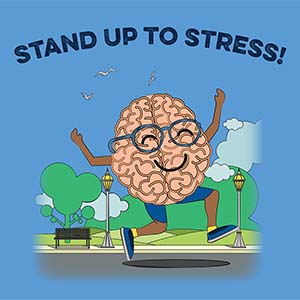
Stress Management Resources
Life can get challenging sometimes, and it’s important for kids to develop strategies for coping with stress or anxiety. Stand Up to Stress! is a coloring and activity book for kids ages 8 to 12 to teach them about stress and anxiety and offers tips for coping in a healthy way. Stress Catcher is a fun “fortune teller” activity that offers some strategies children can practice and use to help manage stress and other difficult emotions. Video tutorials for coping with stress include Getting to Know Your Brain: Dealing with Stress and Guided Visualization: Dealing with Stress.
Grades: Elementary through high school
Produced by: National Institute of Mental Health
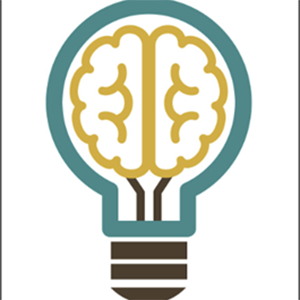
The Partnership in Education: Materials and Resources
The Partnership in Education is a program that creates innovative, hands-on educational products that make science engaging and fun for teachers, students, and learners of all ages. Topics range from the scientific method and evolution to the science of sleep and regenerative medicine. Materials and resources include videos, games, student readings, and curriculum.
Grades: Elementary through high school
Produced by: Duquesne University (SEPA funded)
